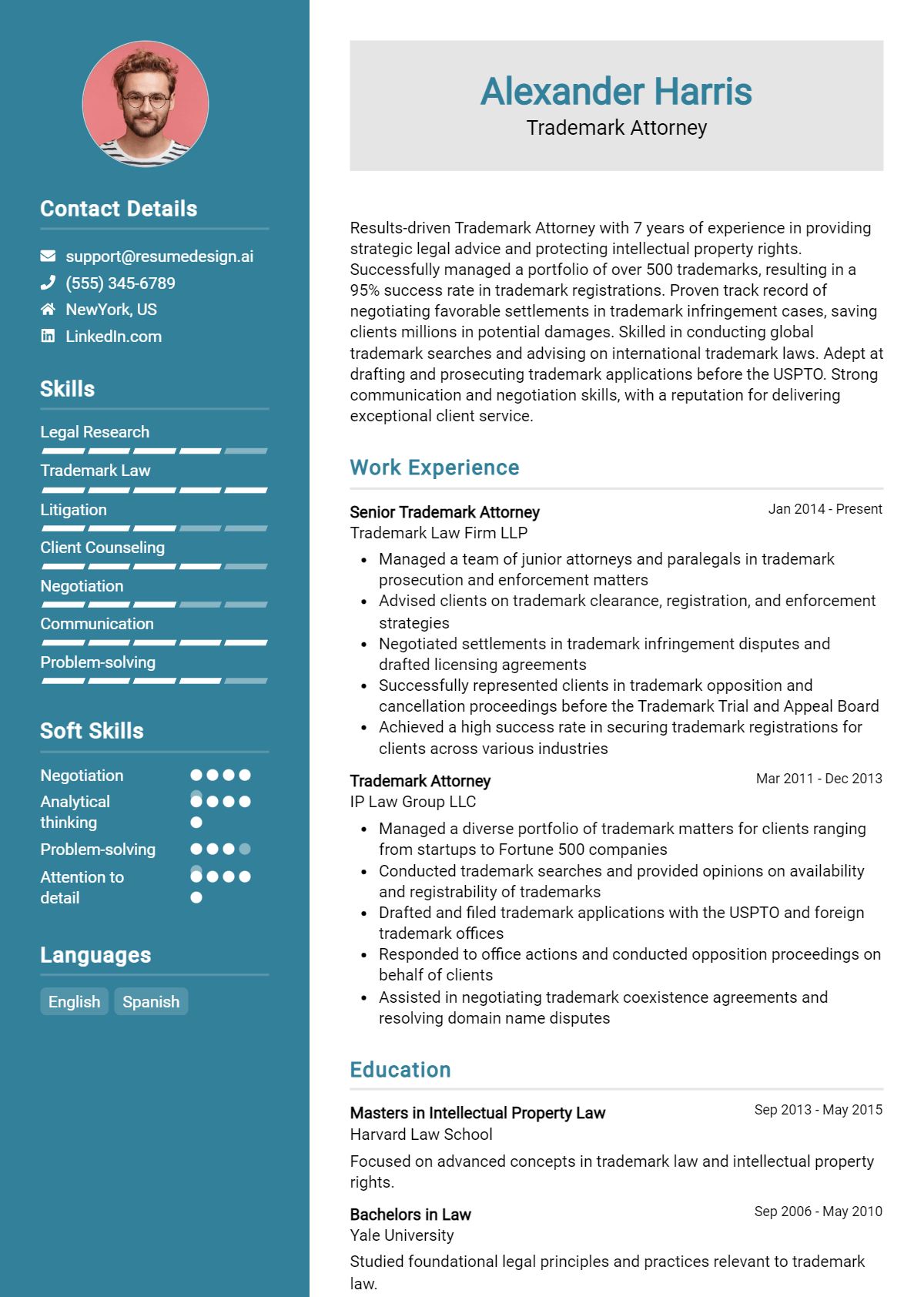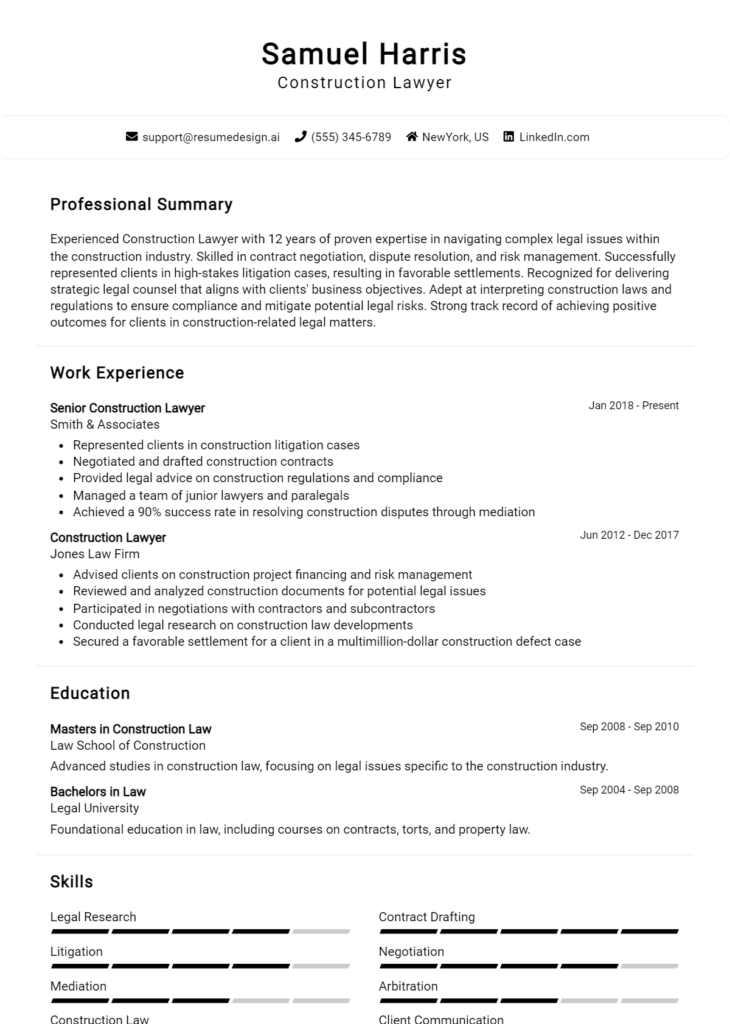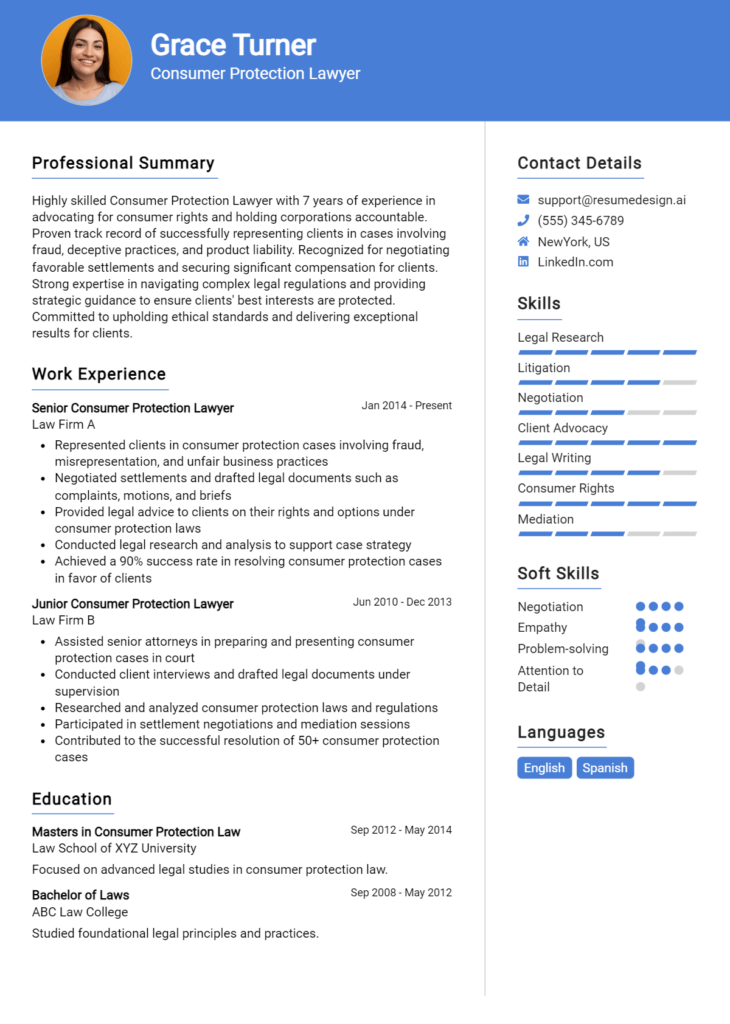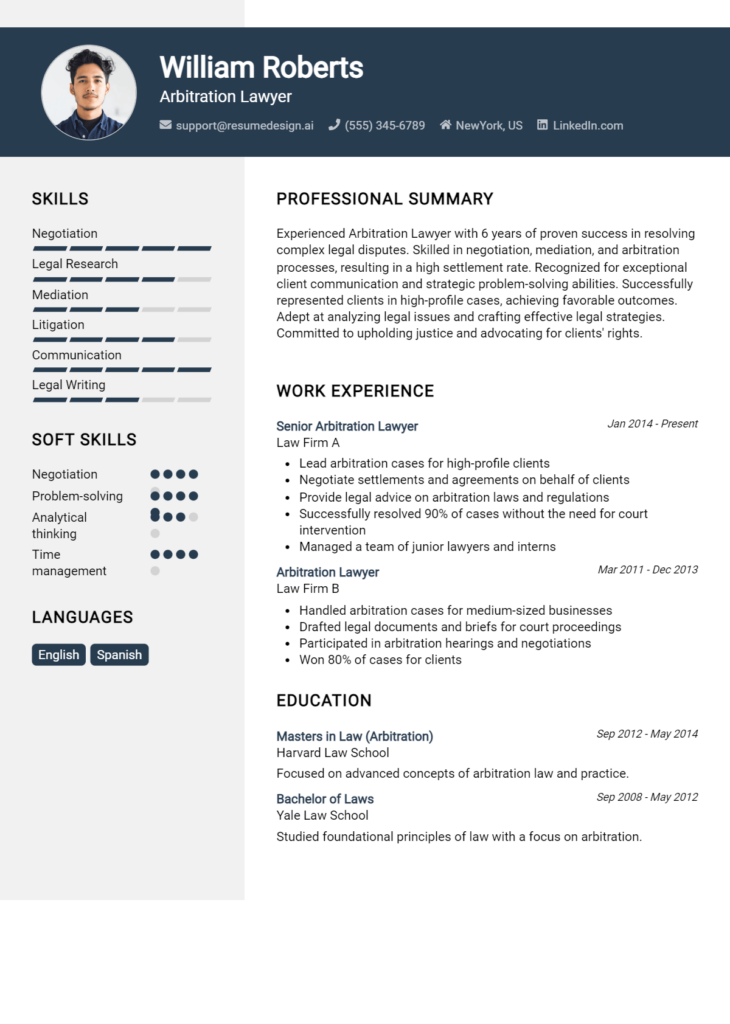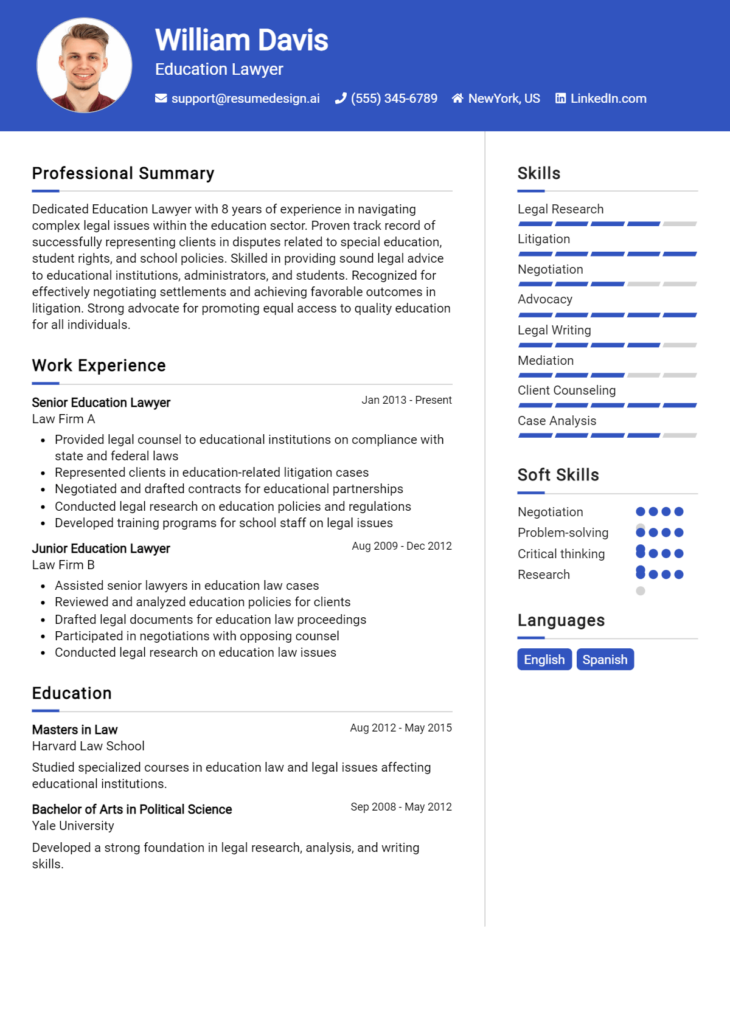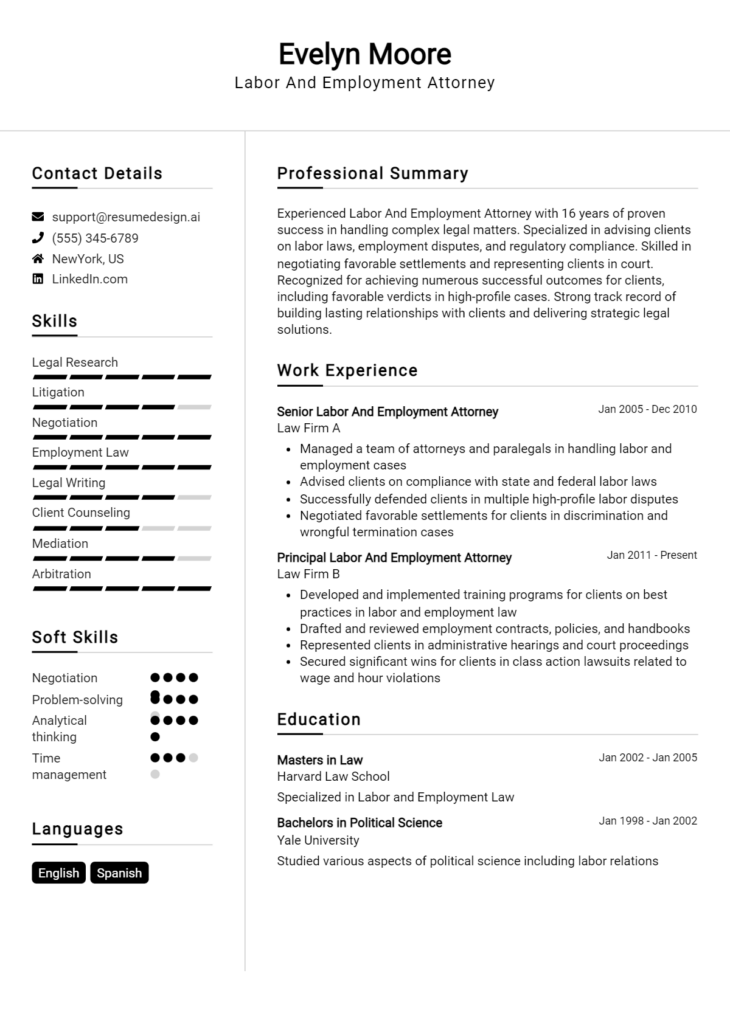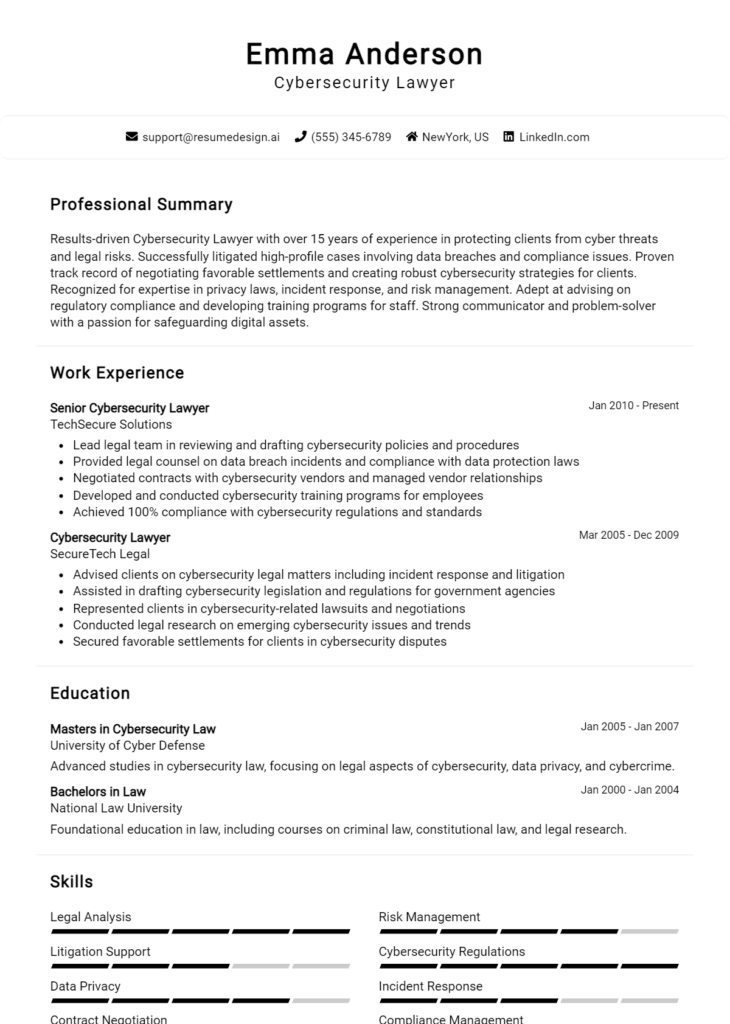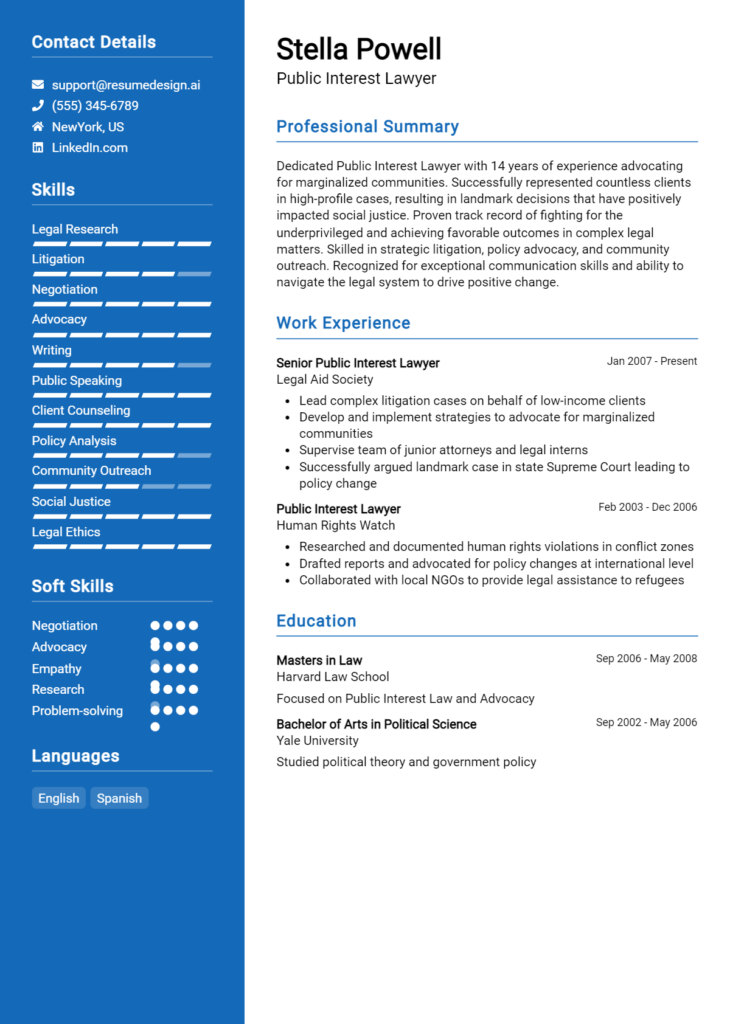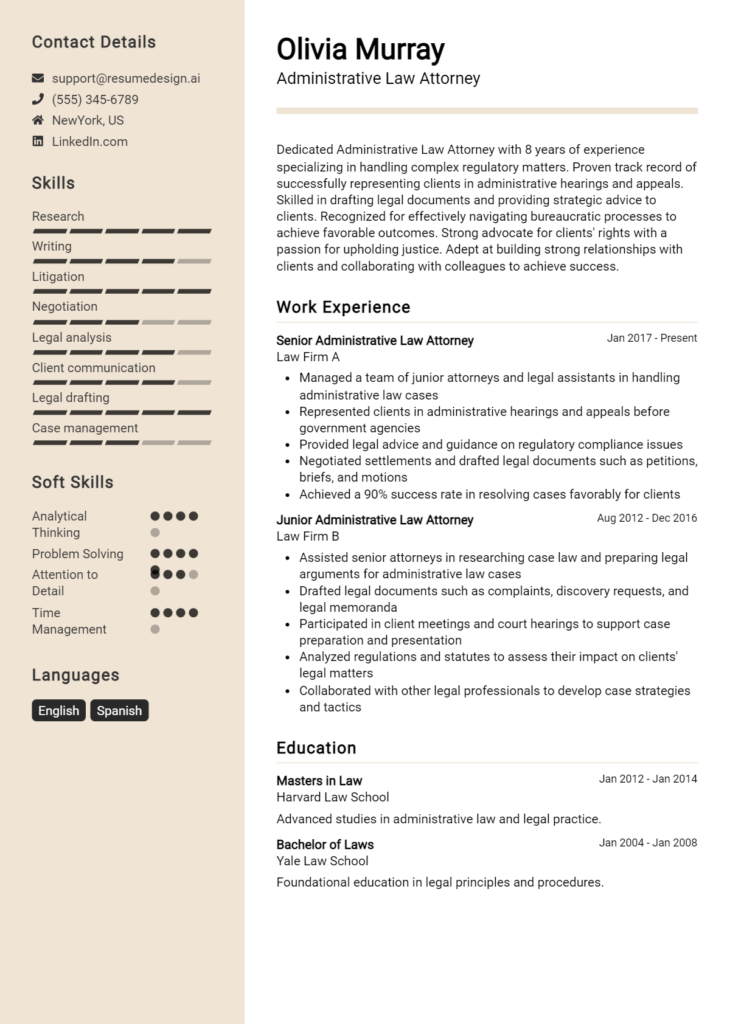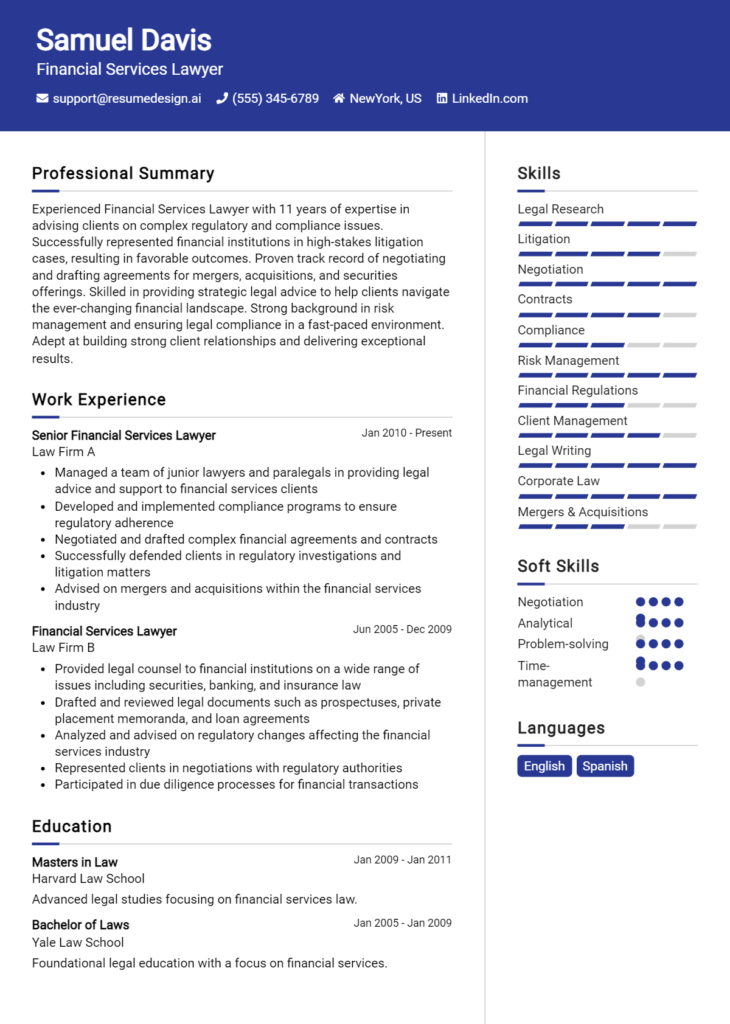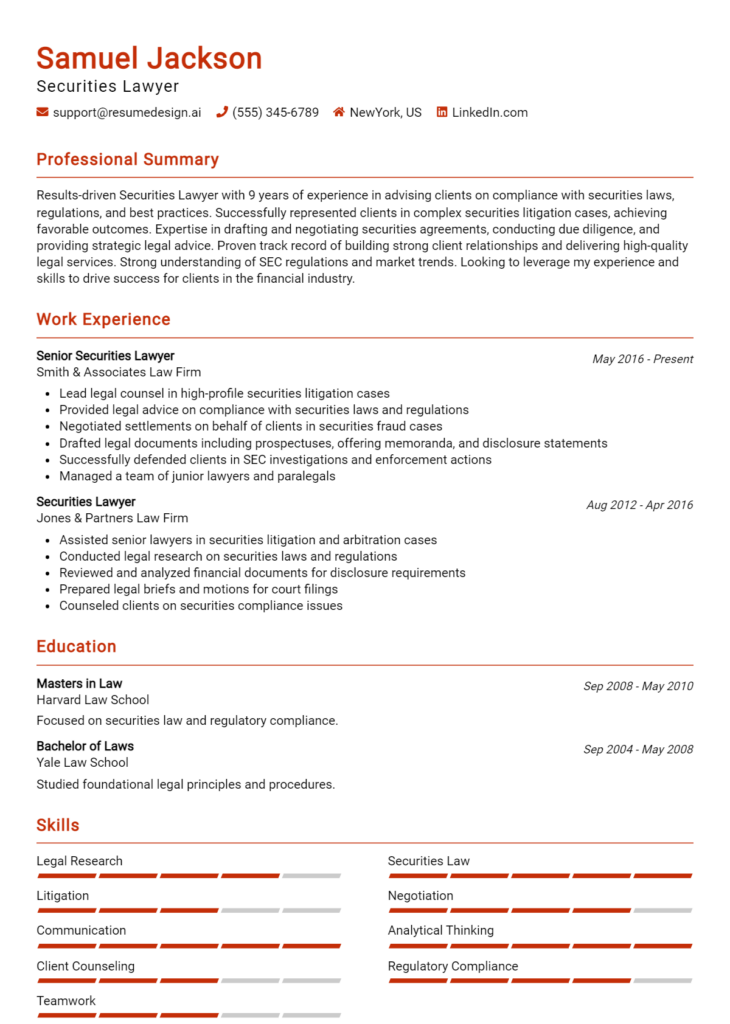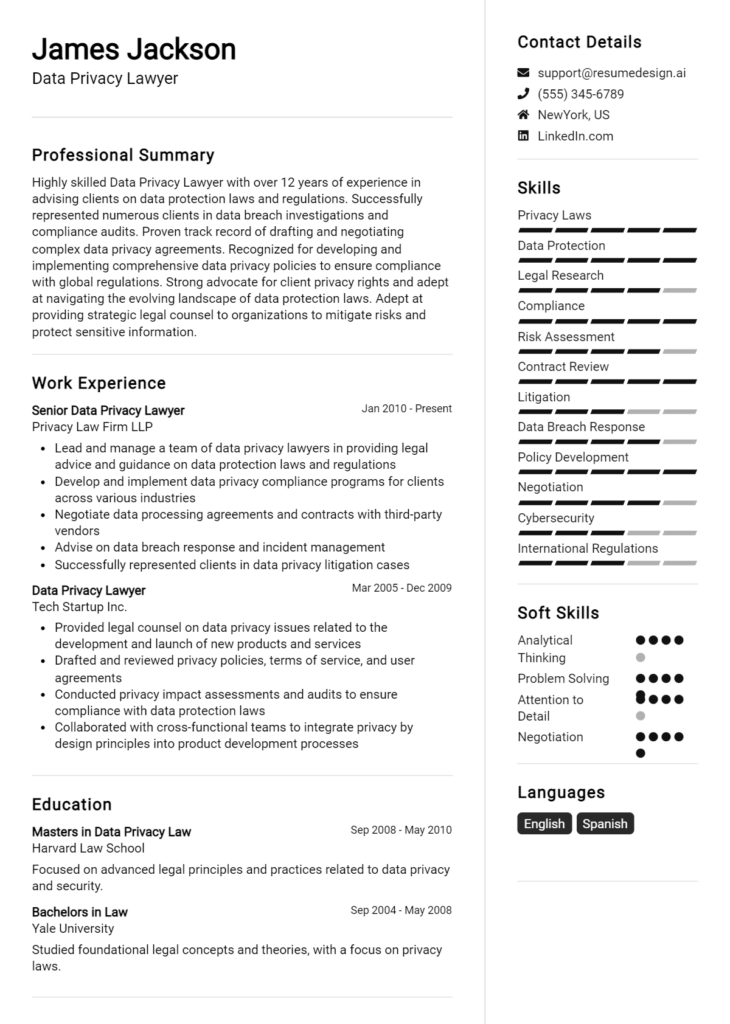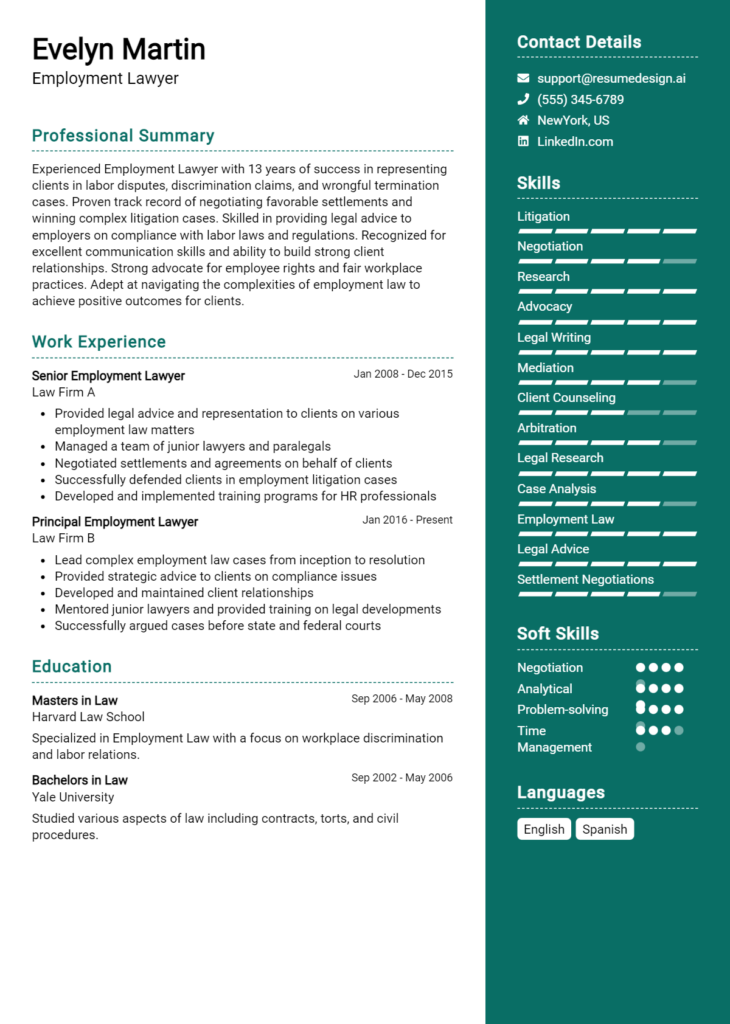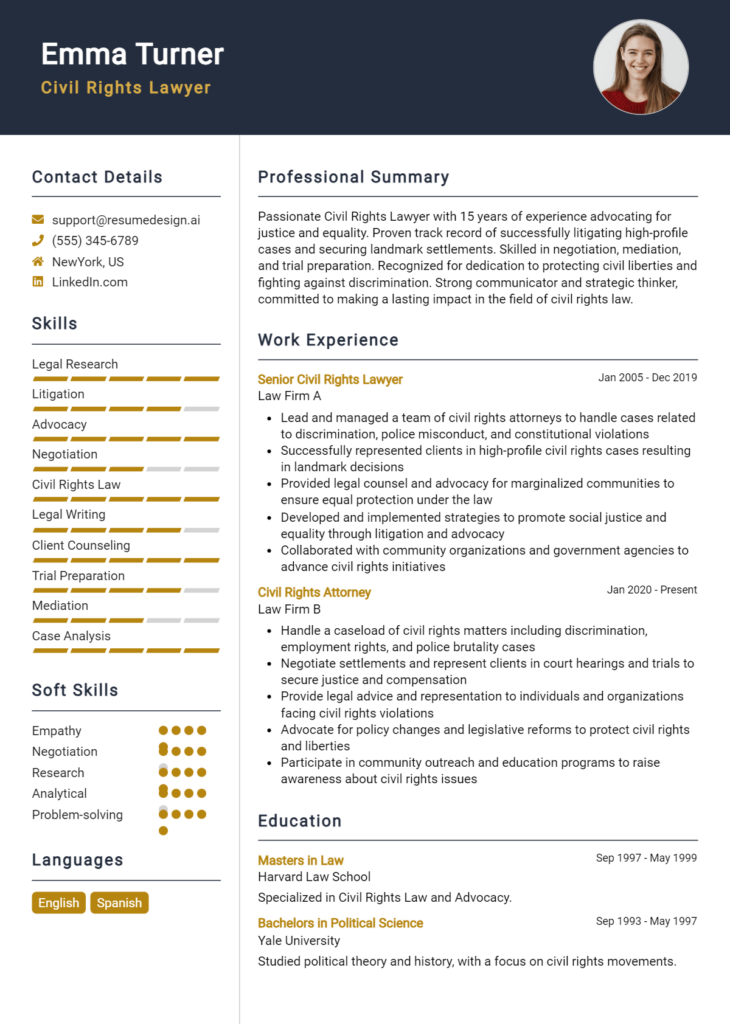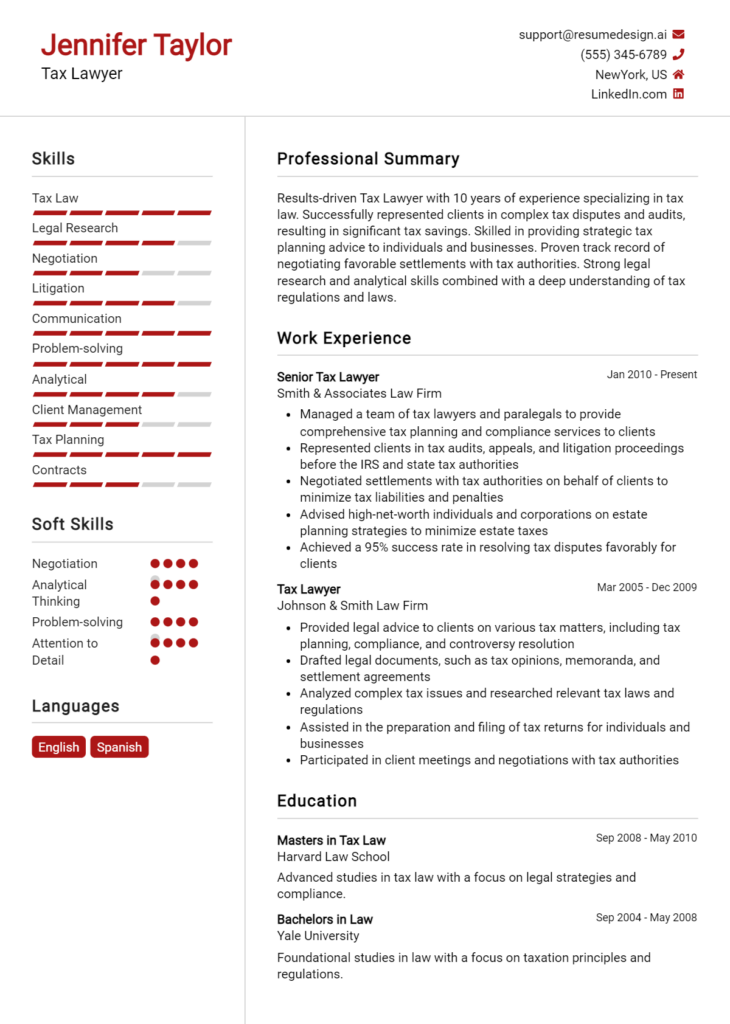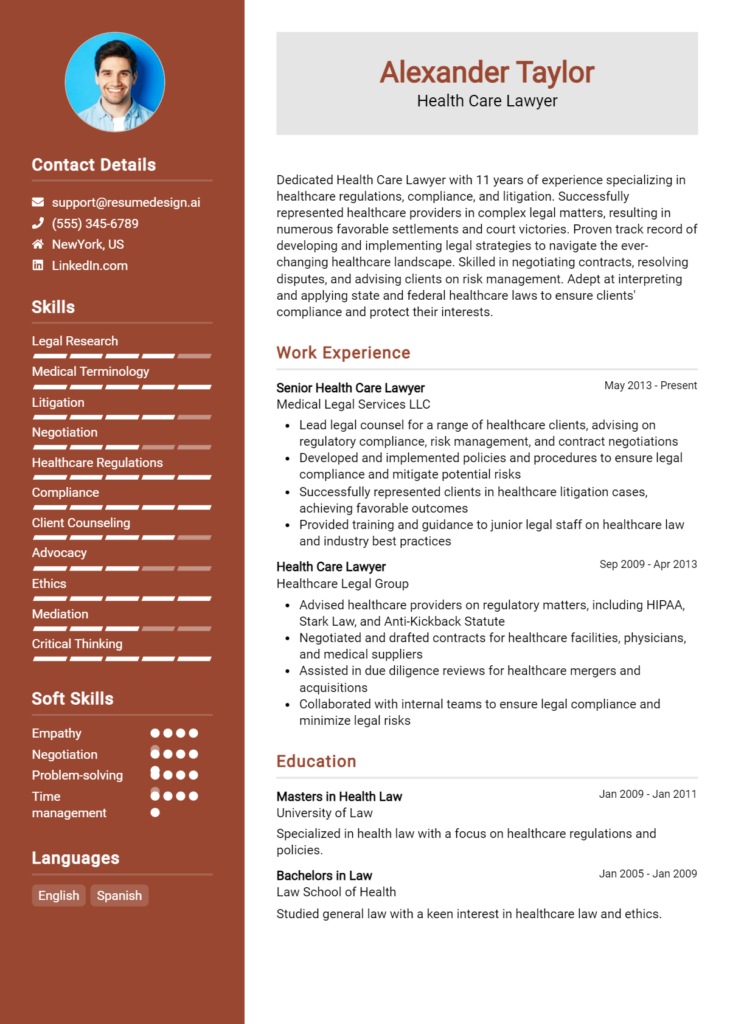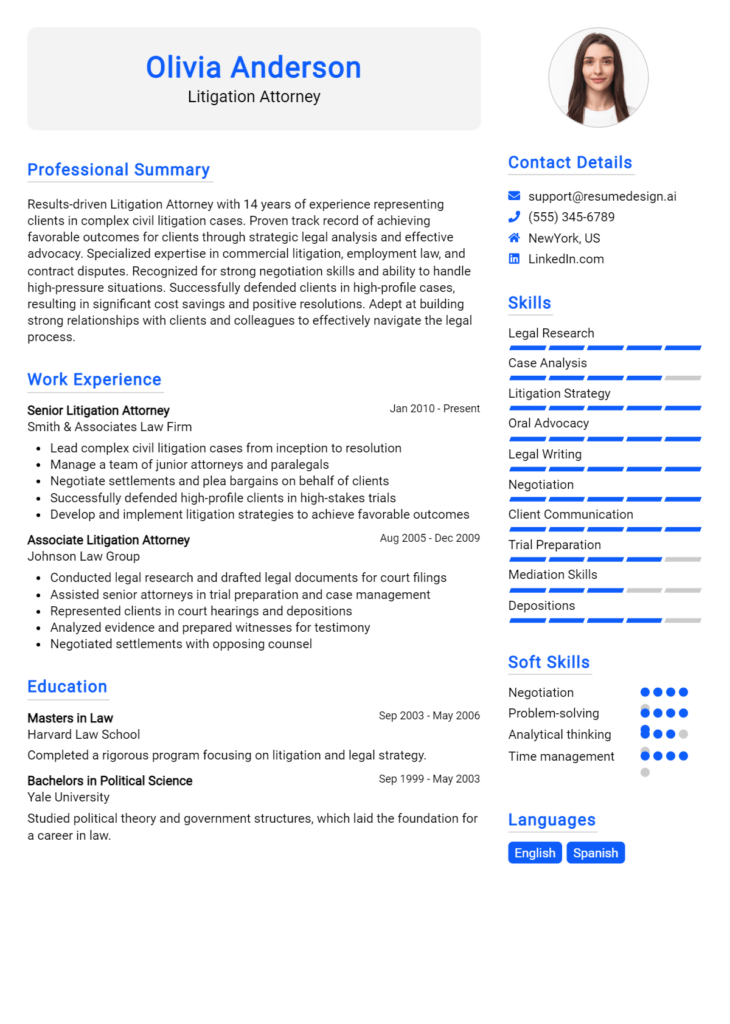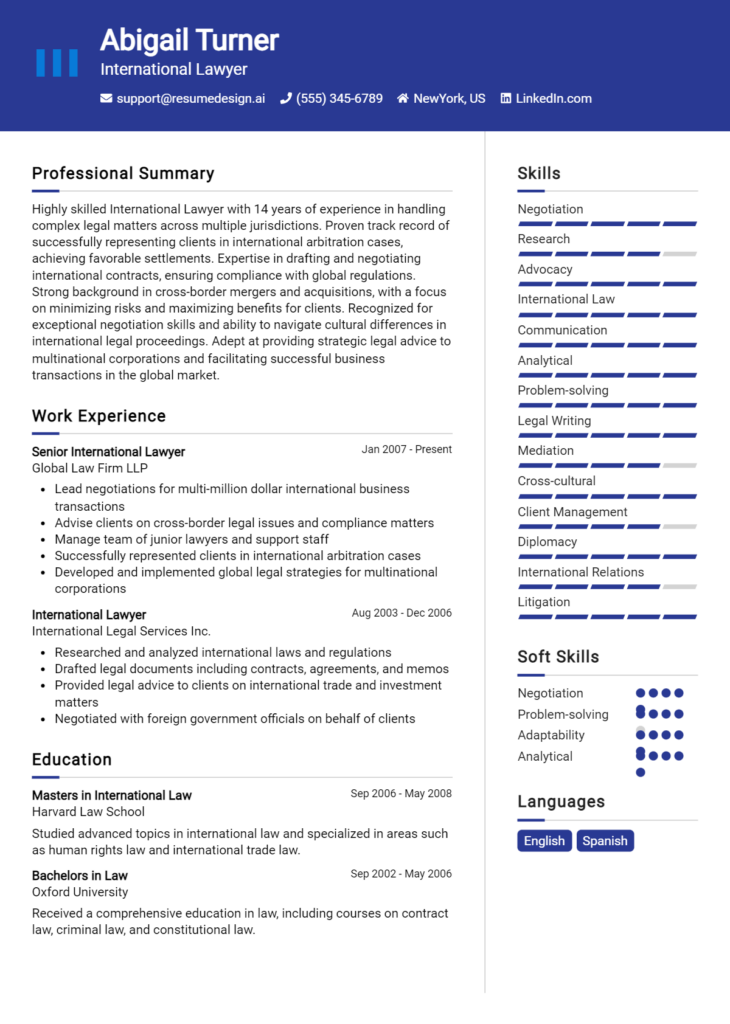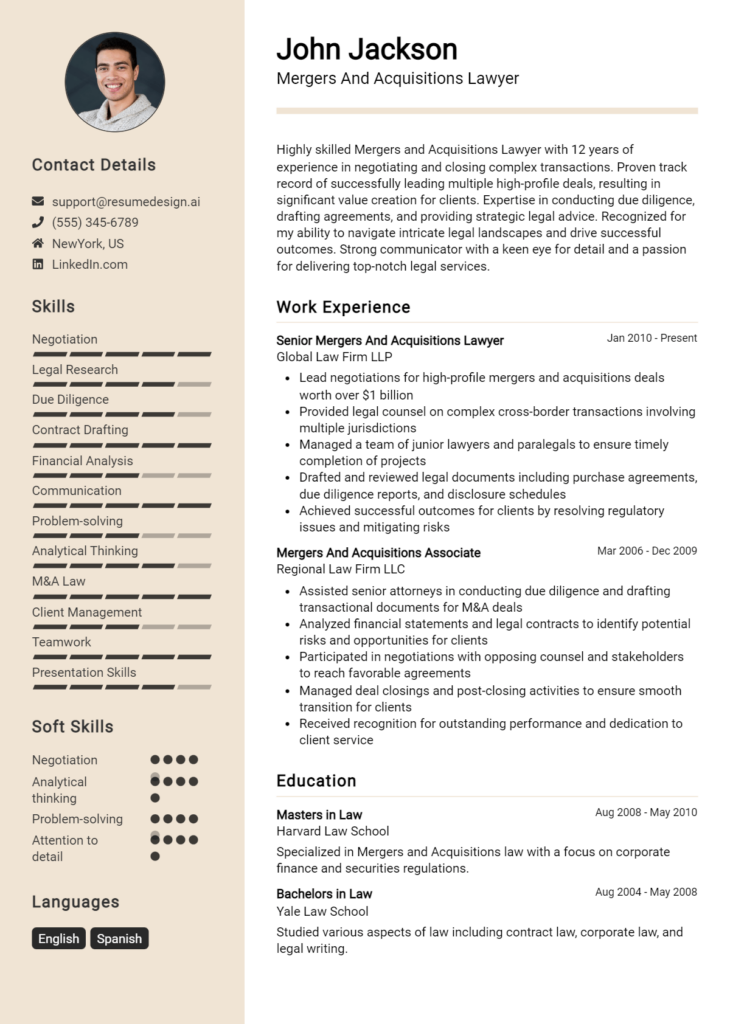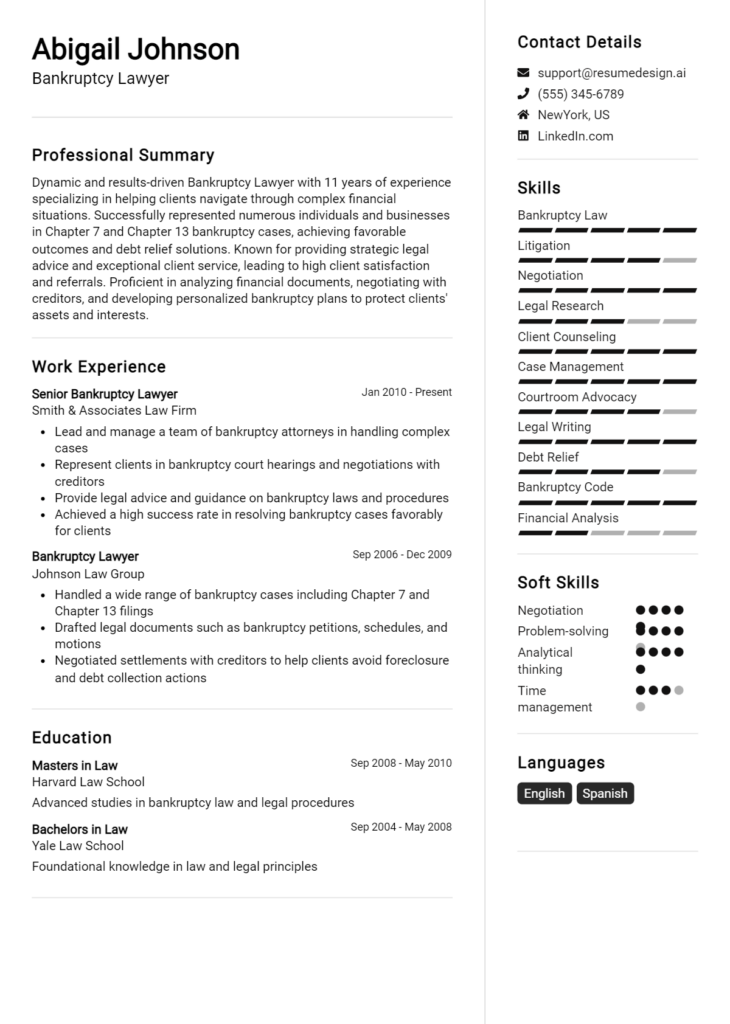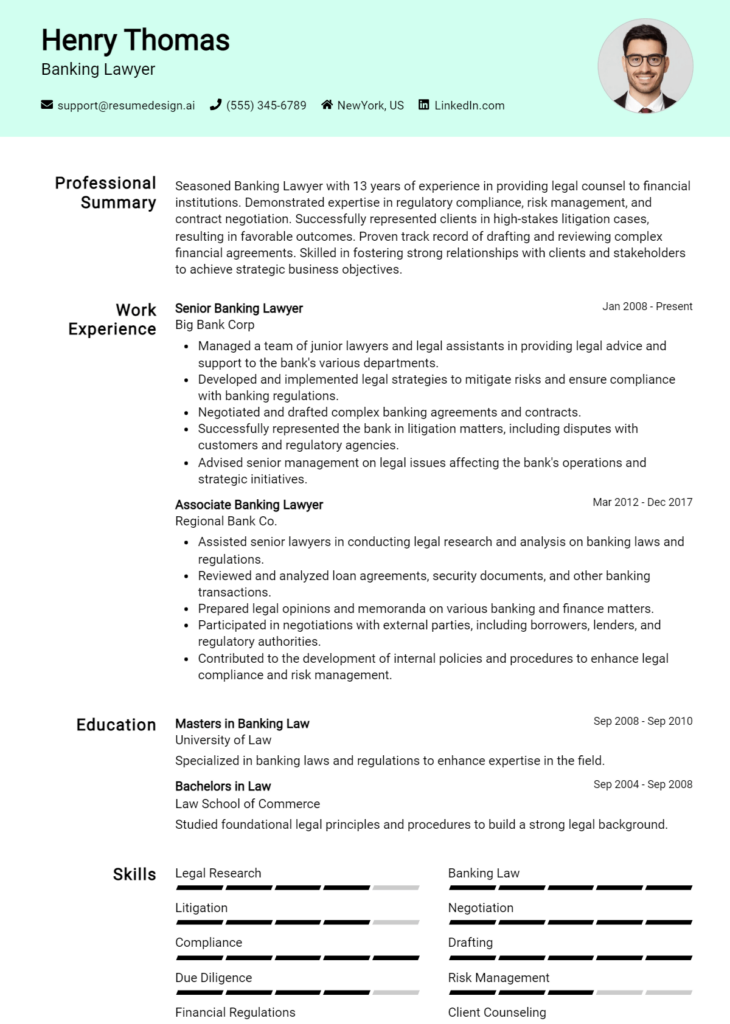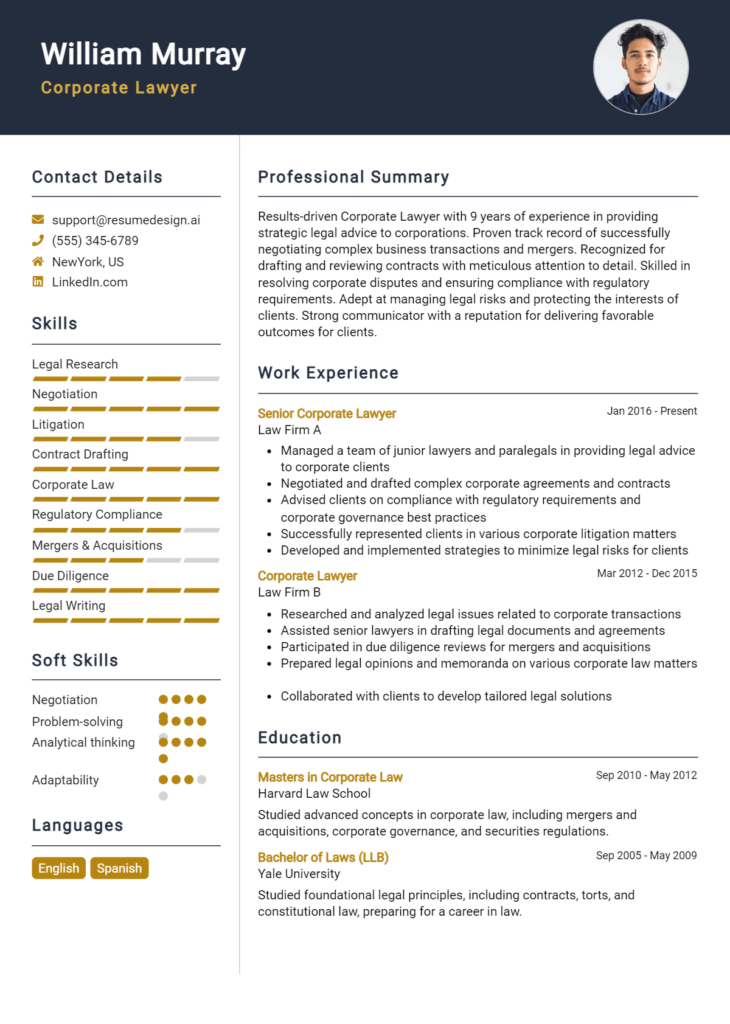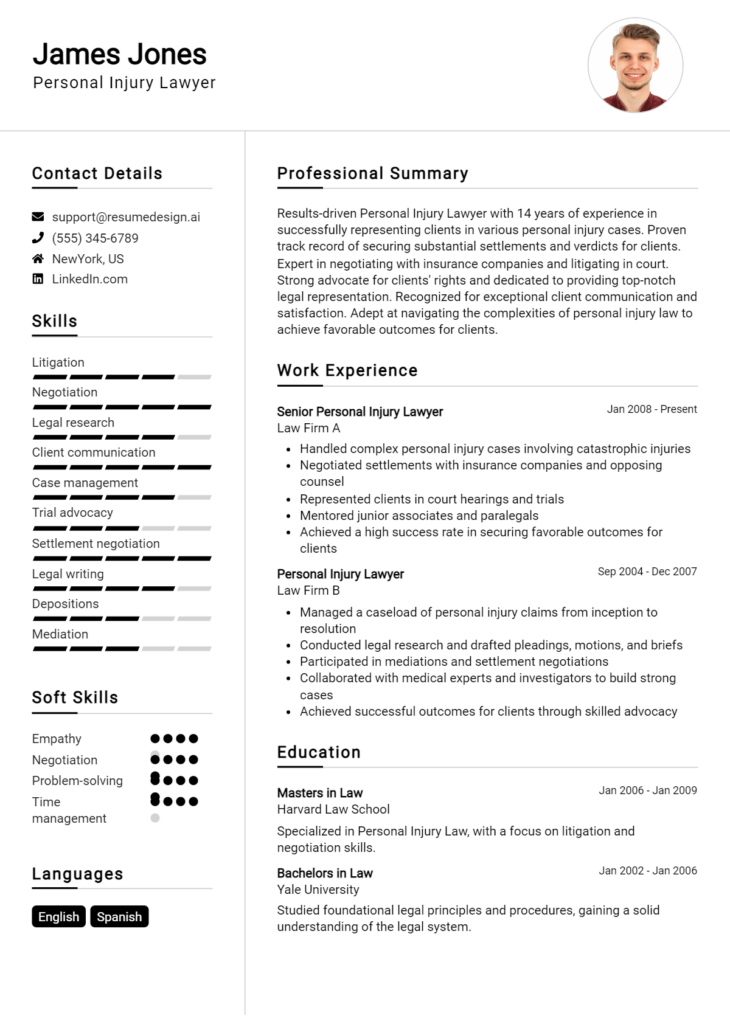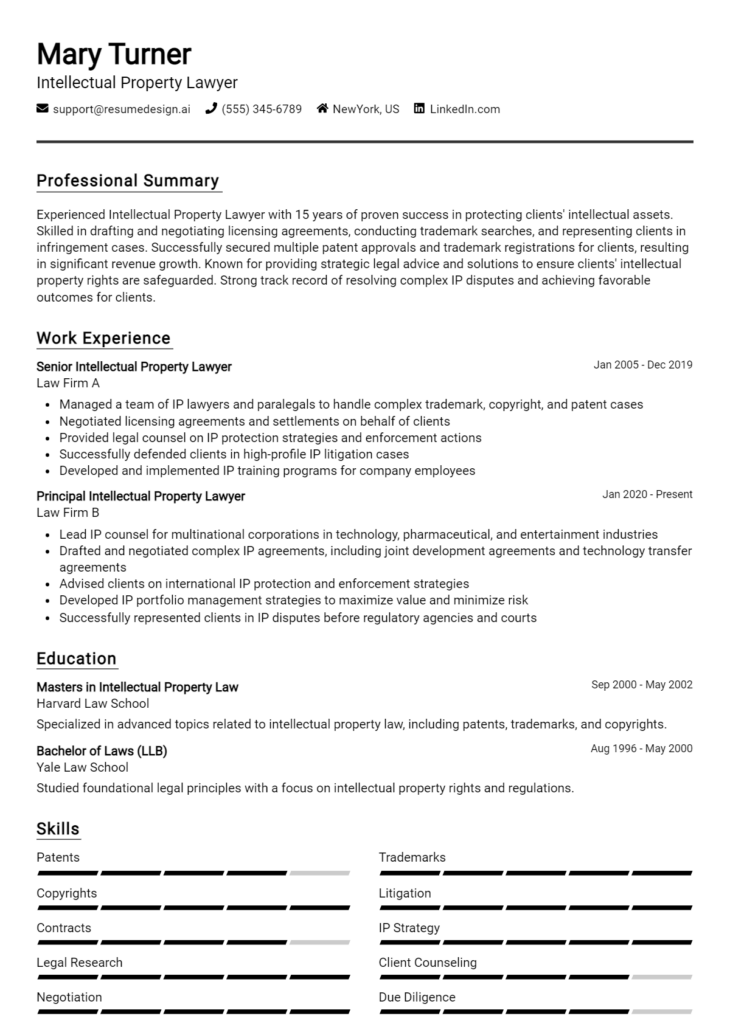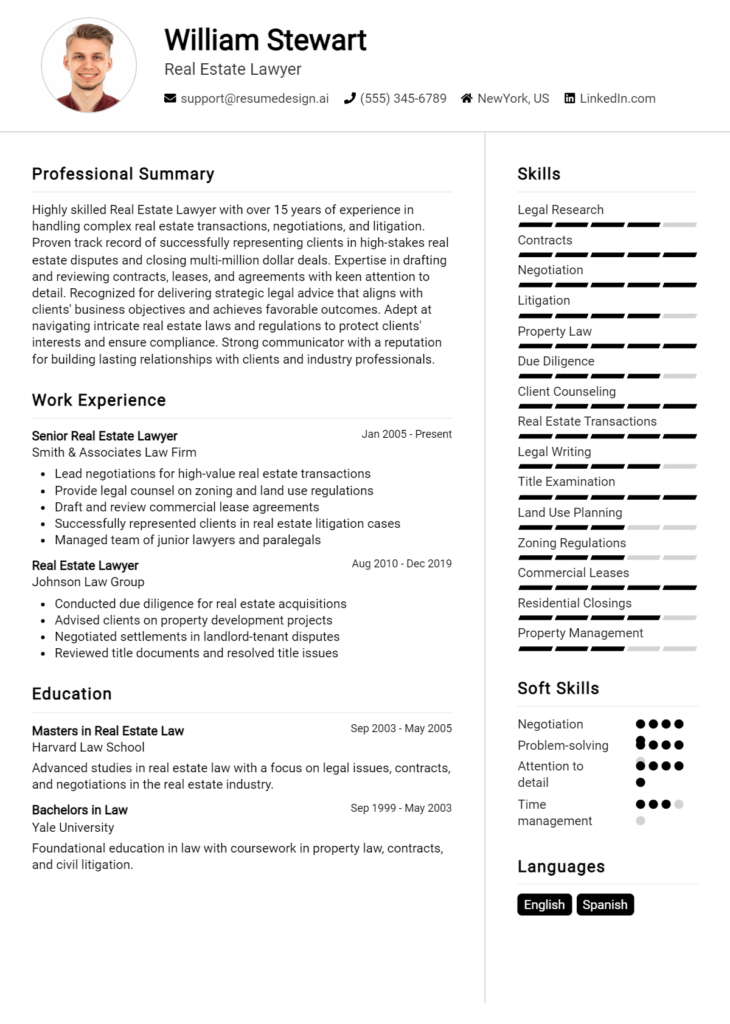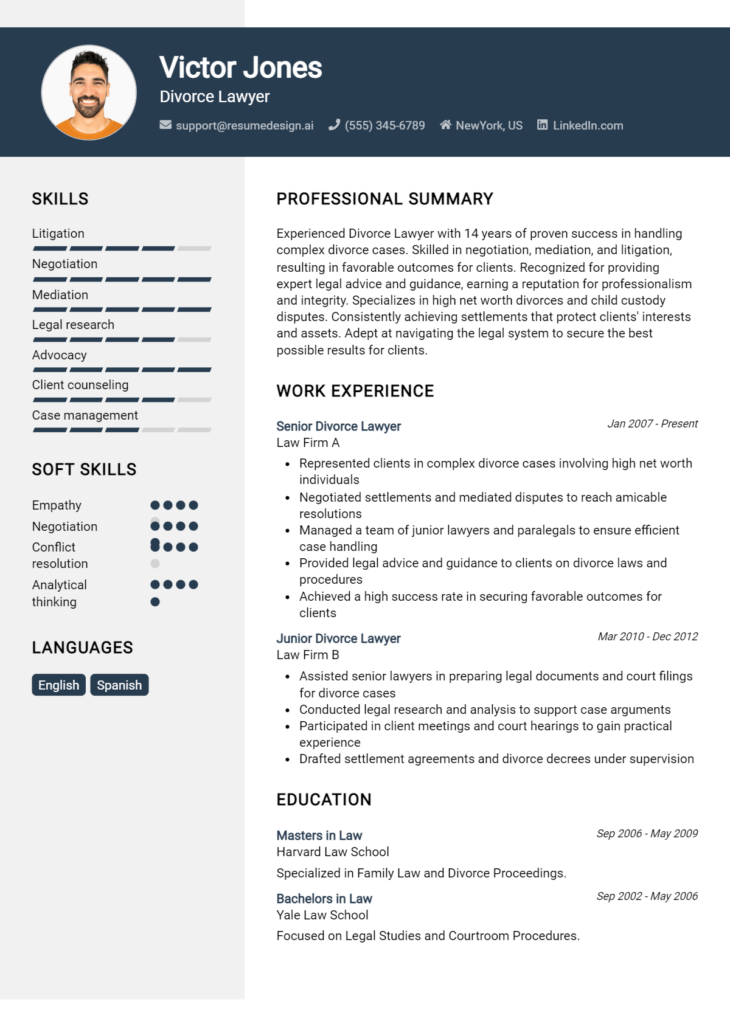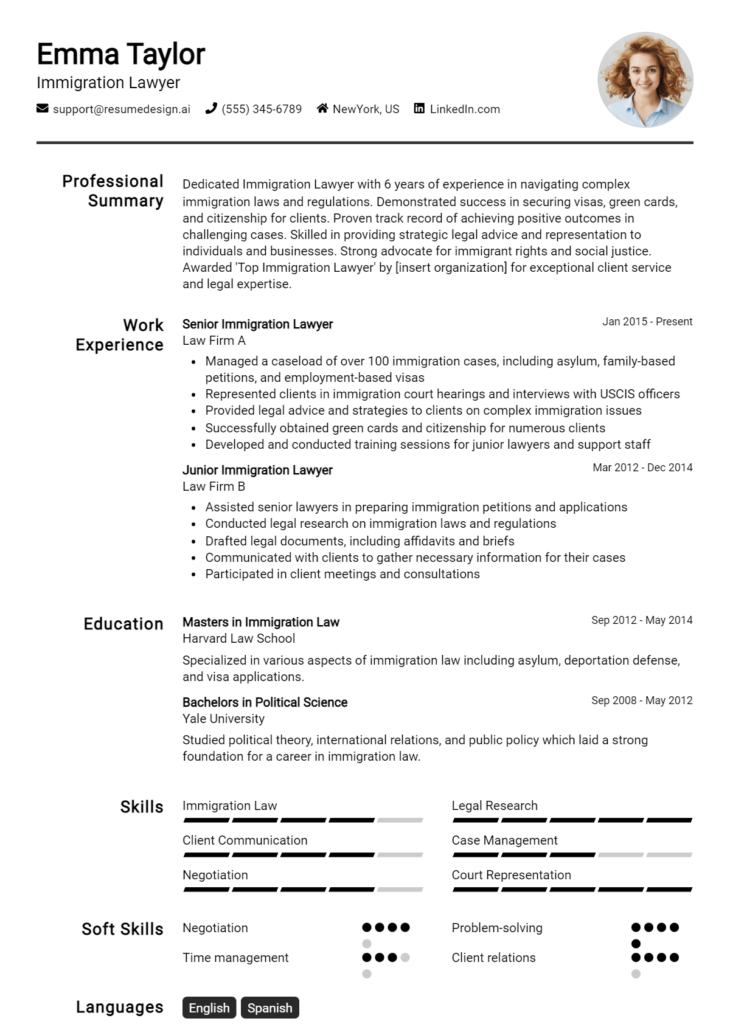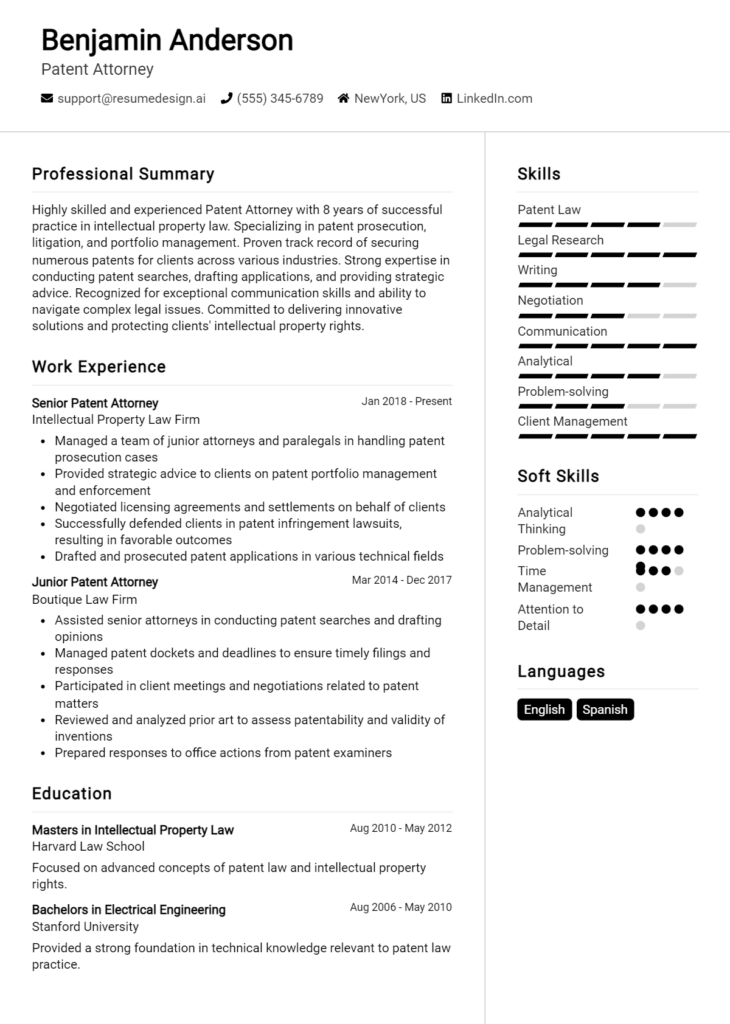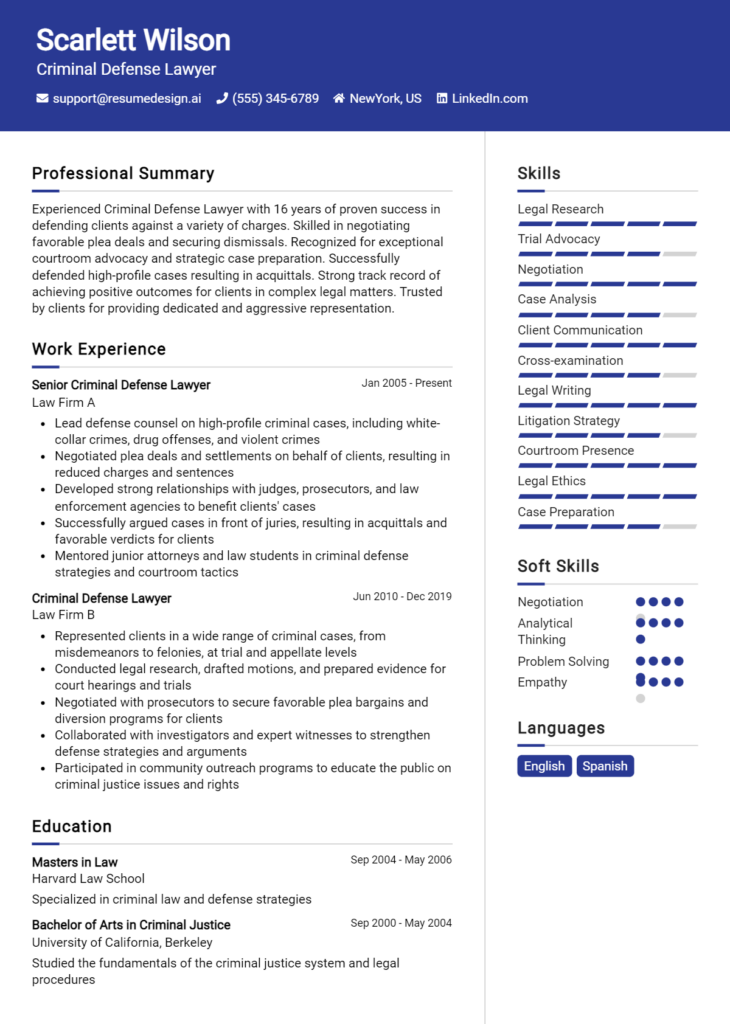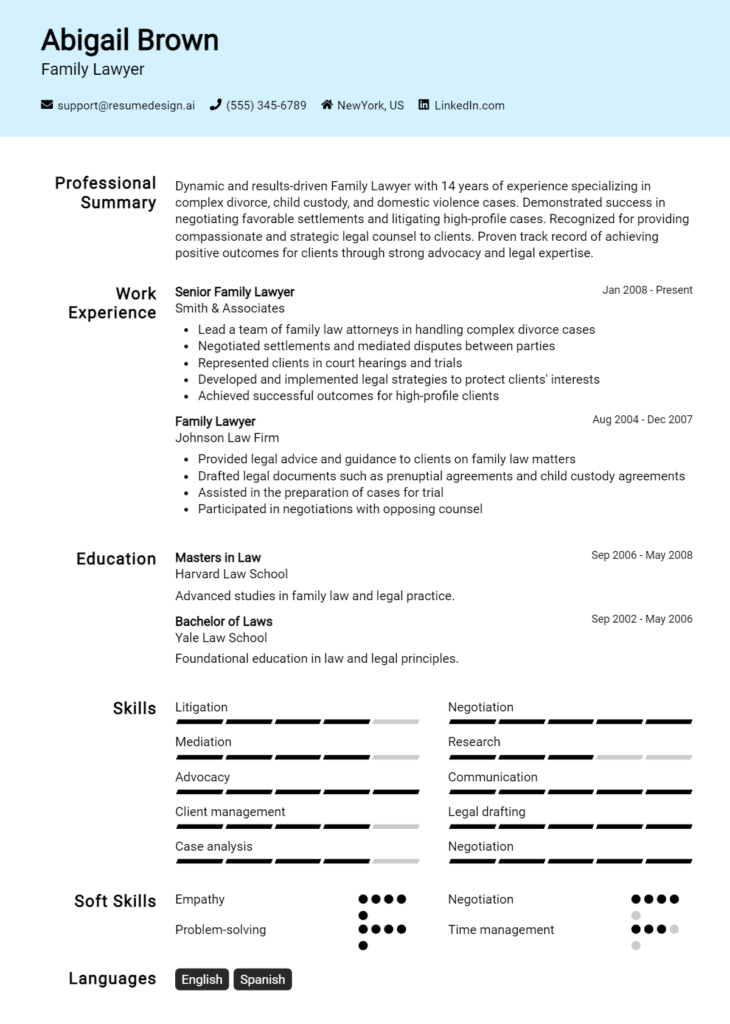Trademark Attorney Core Responsibilities
A Trademark Attorney plays a crucial role in protecting intellectual property by advising clients on trademark registration, infringement issues, and enforcement strategies. This position requires a strong foundation in legal principles, excellent analytical skills, and the ability to navigate complex regulations. Bridging legal, marketing, and operational departments, Trademark Attorneys must possess technical aptitude and problem-solving skills to effectively defend brand identities. A well-structured resume that highlights these competencies can significantly enhance a candidate’s appeal, ultimately contributing to the organization's strategic objectives.
Common Responsibilities Listed on Trademark Attorney Resume
- Conduct comprehensive trademark searches and analyses
- Prepare and file trademark applications and related documents
- Advise clients on trademark registration processes and compliance
- Monitor and enforce trademark rights and address infringements
- Draft and negotiate licensing agreements
- Provide legal opinions on trademark availability and risks
- Assist in trademark litigation and dispute resolution
- Stay updated on trademark law and industry trends
- Collaborate with marketing teams on brand strategy
- Train clients on trademark management and protection
- Manage trademark portfolios and renewals
- Develop and implement trademark policies for organizations
High-Level Resume Tips for Trademark Attorney Professionals
A well-crafted resume is crucial for Trademark Attorney professionals, as it serves as the first impression a candidate makes on potential employers. In a competitive legal landscape, your resume should not only showcase your legal expertise but also reflect your unique skills and achievements in trademark law. A strong resume can set you apart from other candidates and open doors to exciting opportunities. This guide will provide practical and actionable resume tips specifically tailored for Trademark Attorney professionals, helping you to present yourself as the ideal candidate in this specialized field.
Top Resume Tips for Trademark Attorney Professionals
- Tailor your resume to match the job description by incorporating relevant keywords and phrases.
- Highlight your experience with trademark searches, filings, and litigation to showcase your expertise.
- Quantify your achievements, such as the number of successful trademark registrations or cases won.
- Include specific industry-related skills, such as knowledge of trademark databases and familiarity with international trademark law.
- Demonstrate your understanding of trademark infringement and enforcement strategies.
- Provide examples of successful client consultations or negotiations that led to favorable outcomes.
- Showcase your ability to stay updated with evolving trademark laws and regulations.
- Utilize a clean, professional format that makes your resume easy to read and visually appealing.
- Incorporate any relevant certifications or memberships in legal associations related to intellectual property.
- Use action verbs to convey your responsibilities and contributions effectively.
By implementing these tips, you can significantly increase your chances of landing a job in the Trademark Attorney field. A well-structured resume that highlights your skills and achievements will not only attract the attention of hiring managers but also demonstrate your commitment and capability as a trademark law professional.
Why Resume Headlines & Titles are Important for Trademark Attorney
In the competitive field of trademark law, a well-crafted resume headline or title is crucial for a Trademark Attorney. It serves as the first impression a hiring manager has of a candidate, acting as a concise summary that highlights key qualifications and expertise. A strong headline can immediately grab attention, providing a snapshot of the applicant's strengths and suitability for the role. It should be not only relevant and impactful but also succinct—allowing potential employers to quickly grasp the candidate's value proposition without sifting through extraneous details.
Best Practices for Crafting Resume Headlines for Trademark Attorney
- Keep it concise, ideally under 10 words.
- Use specific terminology relevant to trademark law.
- Highlight your most significant achievements or skills.
- Tailor the headline to align with the job description.
- Avoid jargon that may confuse hiring managers.
- Incorporate keywords that reflect your expertise.
- Showcase your unique value proposition.
- Make it compelling to stand out from other candidates.
Example Resume Headlines for Trademark Attorney
Strong Resume Headlines
"Experienced Trademark Attorney with 10+ Years in IP Law"
“Results-Driven Trademark Specialist Focused on Brand Protection”
“Proven Track Record in Trademark Litigation and Registration”
“Dedicated IP Attorney with Expertise in Global Trademark Strategy”
Weak Resume Headlines
“Lawyer Looking for a Job”
“General Attorney with Some Experience”
The strong headlines are effective because they provide clear, relevant information that speaks directly to the qualifications and skills required for a Trademark Attorney position. They emphasize experience, specialization, and accomplishments, allowing hiring managers to quickly assess the candidate's suitability. In contrast, the weak headlines fail to make an impact due to their vagueness and lack of specificity, making it difficult for employers to understand the candidate's true capabilities and potential contributions to their firm.
Writing an Exceptional Trademark Attorney Resume Summary
A well-crafted resume summary is essential for a Trademark Attorney as it serves as the first impression for hiring managers. This brief yet powerful introduction quickly captures attention by highlighting key skills, relevant experience, and notable accomplishments that are directly applicable to the role. An effective summary should be concise and impactful, tailored specifically to the job the candidate is applying for, ensuring that it resonates with the needs and expectations of potential employers.
Best Practices for Writing a Trademark Attorney Resume Summary
- Quantify Achievements: Use specific numbers to illustrate your successes, such as the number of trademarks registered or cases won.
- Focus on Relevant Skills: Highlight key skills that are directly related to trademark law, such as legal research, negotiation, and client counseling.
- Tailor the Summary: Customize the summary for each job application to align with the specific requirements and keywords found in the job description.
- Keep it Concise: Aim for 3-4 sentences that deliver maximum impact without overwhelming the reader.
- Use Action Verbs: Start sentences with strong action verbs to convey a sense of proactivity and dynamism.
- Highlight Industry Knowledge: Mention any specialized knowledge or experience relevant to trademark law and intellectual property.
- Showcase Soft Skills: Include soft skills such as communication, analytical thinking, and attention to detail that are essential for success in the role.
- Proofread: Ensure there are no grammatical or spelling errors, as attention to detail is crucial in the legal profession.
Example Trademark Attorney Resume Summaries
Strong Resume Summaries
Results-driven Trademark Attorney with over 8 years of experience in managing a portfolio of 150+ trademarks, successfully registering and defending intellectual property rights in a competitive marketplace. Proven track record of winning 95% of opposition cases and reducing trademark registration time by 30% through streamlined processes.
Dedicated legal professional specializing in trademark law, with a history of advising clients on compliance and strategy for over 100 successful trademark applications. Recognized for exceptional negotiation skills, leading to a 40% increase in favorable settlements for clients.
Experienced Trademark Attorney with a robust background in litigation and trademark enforcement, having secured over $5 million in damages for clients in infringement cases. Skilled in conducting comprehensive trademark searches and providing strategic legal counsel to startups and established brands alike.
Weak Resume Summaries
Trademark Attorney with some experience in the field. I have worked on various cases and have a good understanding of trademark law.
I am a legal professional who is passionate about trademark issues and seeks to leverage my skills in a new position.
The examples showcase the distinction between strong and weak resume summaries. The strong summaries effectively highlight quantifiable successes, specific skills, and their relevance to the role, making them compelling to hiring managers. In contrast, the weak summaries are vague, lack measurable outcomes, and fail to convey the candidate's unique qualifications, making them less impactful in a competitive job market.
Work Experience Section for Trademark Attorney Resume
The work experience section in a Trademark Attorney resume is vital as it serves as a comprehensive showcase of the candidate's technical skills, managerial abilities, and commitment to delivering high-quality legal services. This section not only reflects the applicant's hands-on experience in trademark law but also reveals their capacity to lead teams and manage complex projects. By quantifying achievements and aligning experiences with industry standards, candidates can effectively demonstrate their impact in previous roles, making their application more compelling to prospective employers.
Best Practices for Trademark Attorney Work Experience
- Highlight relevant technical skills, such as trademark search analysis, registration processes, and litigation support.
- Quantify achievements, such as the number of trademarks successfully registered or the percentage of cases won.
- Detail collaborative efforts with clients, teams, and external stakeholders to showcase teamwork and communication skills.
- Use industry-specific terminology to demonstrate familiarity with trademark laws and regulations.
- Focus on outcomes and results, rather than just duties performed.
- Include leadership roles in projects or initiatives that contributed to the firm's success.
- Tailor the work experience to align with the job description of the position being applied for.
- Show continuous professional development, such as participation in trademark law seminars or relevant certifications.
Example Work Experiences for Trademark Attorney
Strong Experiences
- Successfully managed the registration of over 150 trademarks, resulting in a 20% increase in client portfolio value within one year.
- Led a team of four attorneys in a high-stakes trademark infringement case, achieving a favorable settlement that saved the client over $500,000 in potential damages.
- Collaborated with international clients to navigate complex trademark laws across five jurisdictions, enhancing the firm's global reach and expertise.
- Developed and implemented a streamlined trademark search process that reduced turnaround time by 30%, improving client satisfaction scores significantly.
Weak Experiences
- Assisted with trademark applications and paperwork.
- Worked on various legal cases and projects.
- Participated in team meetings and discussions about trademarks.
- Handled client inquiries regarding trademark processes.
The examples provided illustrate a clear distinction between strong and weak experiences. Strong experiences are characterized by specific outcomes, quantifiable achievements, and proactive leadership, demonstrating the candidate's direct impact on their prior employers. In contrast, weak experiences tend to be vague and lack measurable results, failing to convey the candidate's actual contributions or proficiency in trademark law. This highlights the importance of crafting detailed, results-oriented statements in the work experience section.
Education and Certifications Section for Trademark Attorney Resume
The education and certifications section of a Trademark Attorney resume is crucial as it serves to underscore the candidate's academic achievements and professional qualifications in a highly specialized field. This section not only showcases the candidate's foundational legal education but also highlights any industry-relevant certifications and ongoing professional development efforts. By including pertinent coursework, specialized training, and recognized credentials, candidates can significantly enhance their credibility and demonstrate their alignment with the requirements of the job role, making them a more appealing choice to potential employers.
Best Practices for Trademark Attorney Education and Certifications
- Prioritize relevant degrees such as Juris Doctor (JD) from an accredited law school.
- Include industry-recognized certifications like the Registered Patent Attorney or certifications from organizations like INTA.
- Detail specialized coursework in intellectual property law, trademark law, or related fields.
- Highlight any continuing legal education (CLE) courses focused on trademark updates and developments.
- List any honors or awards received during your academic career to demonstrate excellence.
- Emphasize professional affiliations with legal organizations related to trademarks and intellectual property.
- Be concise but thorough; avoid overly detailed descriptions that may detract from key points.
- Ensure all information is current and reflects your most up-to-date qualifications.
Example Education and Certifications for Trademark Attorney
Strong Examples
- Juris Doctor (JD), Harvard Law School, 2015 - Focused on Intellectual Property Law.
- Certified Trademark Specialist, International Trademark Association (INTA), 2021.
- Coursework: Advanced Trademark Law, Patent Law, and Copyright Law, University of California, Berkeley, 2014.
- Member, American Bar Association, Intellectual Property Law Section, 2016-Present.
Weak Examples
- Bachelor of Arts in History, University of Texas, 2012 - Not relevant to trademark law.
- Certification in General Legal Studies, Online University, 2018 - Lacks specific focus on trademark law.
- Coursework: Introduction to Business, Community College, 2010 - Not applicable to trademark practice.
- Member, Law Society of a Non-relevant Field, 2015 - Not related to intellectual property or trademarks.
The examples provided are considered strong because they directly reflect relevant educational qualifications and certifications that are essential for a Trademark Attorney role. They showcase advanced degrees, specialized training, and active participation in professional organizations, all of which enhance the candidate's credibility in the field. Conversely, the weak examples illustrate educational qualifications that do not align with trademark law or lack specificity in the area of intellectual property, making them less impactful for potential employers looking for qualified candidates in this niche legal practice.
Top Skills & Keywords for Trademark Attorney Resume
A well-crafted resume for a Trademark Attorney not only showcases legal expertise but also highlights essential skills that are crucial for success in this specialized field. The ability to navigate the complex landscape of intellectual property law requires both hard and soft skills, enabling attorneys to effectively protect their clients' trademarks and ensure compliance with regulations. Emphasizing these skills in a resume can make a significant difference, as they demonstrate a candidate's capability to handle the nuanced demands of trademark law and client relationships.
Top Hard & Soft Skills for Trademark Attorney
Soft Skills
- Strong communication skills
- Attention to detail
- Analytical thinking
- Negotiation skills
- Problem-solving abilities
- Client relationship management
- Time management
- Adaptability and flexibility
- Team collaboration
- Ethical judgment and integrity
Hard Skills
- Knowledge of trademark law and regulations
- Proficiency in legal research
- Experience with trademark registration processes
- Familiarity with intellectual property databases
- Drafting and reviewing legal documents
- Understanding of litigation processes
- Ability to conduct trademark searches
- Knowledge of global trademark laws
- Experience with trademark enforcement strategies
- Proficiency in using trademark management software
By focusing on these skills, a Trademark Attorney can effectively present their qualifications and experiences. Additionally, showcasing relevant work experience further enhances their resume, positioning them as a well-rounded candidate in the competitive field of intellectual property law.
Stand Out with a Winning Trademark Attorney Cover Letter
Dear [Hiring Manager's Name],
I am writing to express my interest in the Trademark Attorney position at [Company Name], as advertised on [Job Board/Company Website]. With a robust background in intellectual property law and a passion for protecting brands, I am excited about the opportunity to contribute to your esteemed firm. My experience in trademark prosecution, litigation, and client counseling has equipped me with the skills necessary to navigate the complexities of trademark law effectively.
Throughout my career, I have successfully managed a diverse portfolio of trademark applications, conducting comprehensive searches and providing thorough analyses to ensure clients’ intellectual properties are safeguarded. My role at [Previous Company Name] involved collaborating with clients to develop effective trademark strategies that not only protected their current assets but also anticipated future challenges in the evolving marketplace. I pride myself on my ability to communicate complex legal concepts in an accessible manner, fostering strong relationships with clients and providing them with the confidence they need to make informed decisions.
In addition to my technical skills, I bring a proactive mindset and a commitment to staying current with the latest developments in trademark law and regulations. My participation in professional organizations and ongoing education ensures that I remain at the forefront of industry trends, enabling me to provide clients with innovative solutions tailored to their specific needs. I am particularly drawn to [Company Name] because of its reputation for excellence and its commitment to client service, and I am eager to bring my expertise to your dynamic team.
Thank you for considering my application. I am looking forward to the opportunity to discuss how my background, skills, and enthusiasms align with the goals of [Company Name]. I am excited about the possibility of contributing to your team and helping clients navigate the complexities of trademark protection.
Sincerely,
[Your Name]
[Your Phone Number]
[Your Email Address]
Common Mistakes to Avoid in a Trademark Attorney Resume
When crafting a resume for a Trademark Attorney position, precision and clarity are paramount. A well-structured resume not only showcases your qualifications but also reflects your attention to detail—an essential trait for a legal professional. However, many candidates make common mistakes that can detract from their credentials and hinder their chances of securing an interview. Here are some common pitfalls to avoid:
Neglecting Keywords: Failing to include relevant keywords from the job description can lead to your resume being overlooked by applicant tracking systems (ATS) used by many firms.
Vague Job Descriptions: Providing unclear or overly generic descriptions of past roles can prevent hiring managers from understanding your specific contributions and expertise in trademark law.
Ignoring Relevant Experience: Omitting internships, volunteer work, or projects that relate to intellectual property law can diminish the perceived depth of your experience.
Typos and Grammatical Errors: Errors in spelling or grammar can undermine your professionalism and attention to detail, which are critical in legal work.
Overloading with Jargon: Using excessive legal jargon or complex terminology may alienate hiring managers who may be looking for clear and concise communication skills.
Inconsistent Formatting: A resume that lacks consistent formatting can appear unprofessional and disorganized, making it difficult for recruiters to navigate your qualifications.
Lack of Quantifiable Achievements: Not including specific metrics or achievements (e.g., successful trademark registrations) can make your accomplishments seem less impactful.
Personal Information Overload: Including unnecessary personal details, such as a photo or marital status, can distract from your professional qualifications and is often not relevant to the role.
Conclusion
As a Trademark Attorney, your role is crucial in protecting intellectual property and guiding clients through the complex landscape of trademark registration and enforcement. Throughout this article, we explored the essential skills and qualifications needed for this profession, such as a deep understanding of trademark law, strong analytical skills, and effective communication abilities. We also highlighted the importance of staying updated with the latest legal developments and market trends to provide the best counsel to your clients.
In conclusion, if you are looking to advance your career as a Trademark Attorney, it's vital to ensure that your resume stands out. Take the time to review and refine your Trademark Attorney Resume to effectively showcase your expertise and experience. To assist you in this process, we encourage you to utilize various resources available:
- Explore resume templates that can help you create a professional layout.
- Use our resume builder to craft a tailored resume that meets the demands of the legal industry.
- Check out resume examples for inspiration on how to present your qualifications effectively.
- Don't forget to enhance your application with a compelling cover letter template that highlights your passion for trademark law.
Take the next step in your career today by refining your resume and making sure it reflects your skills as a Trademark Attorney!

